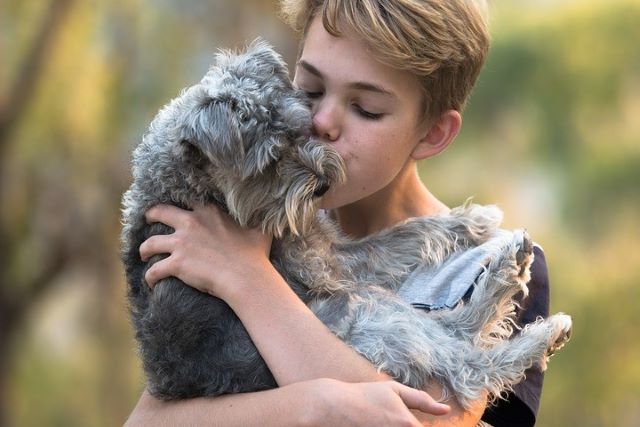It is important to learn everything that you can about the personality of a Schnoodle before you decide that it is the right dog for you. So, what is the Schnoodle’s temperament like? Read on to find out.

Schnoodles are incredibly affectionate dogs that love attention. They are very intelligent, but can sometimes be stubborn too, which may make them difficult to train if you start later. These watchdogs are great family pets provided they are given enough exercise and mental stimulation.
All animals are different. It is impossible to say that all breed characteristics will apply to your Schnoodle. But there are definitely some traits that occur very often. Let’s look at some of those, and what may affect the temperament of the Schnoodle.
Basic Schnoodle Temperament
Stubborn
Schnoodles often inherit the stubbornness of the Schnauzer. This can be seen in a few areas, but mostly when following commands that the Schnoodle doesn’t necessarily want to. The problem is that those are often the critical commands, such as recall.
Ideally, the Schnoodle should not be as stubborn as the Schnauzer, due to the presence of Poodle genetics, but sometimes they seem just as bad.
Food Driven
Schnoodles are very food driven. This means that, if you have a treat, they are willing to do anything for it. While this can assist when doing training with treats, this can also be a disadvantage.
The Schnoodle is prone to weight problems because they will eat everything. They also try to grab things off countertops and out of the hands of young children.
Intelligent

The Schnauzer and the Poodle are both very intelligent dogs. In most cases, the Schnoodle mimics this intelligence. This means that, as long as they have the right motivation, they are straightforward to train.
Schnoodles do very well in more difficult classes where they do not get bored as often. This intelligence also means that they enjoy playing with puzzles like this one.
Skittish/ Anxious
Schnoodles are often skittish or anxious. If they are not used to it, they do not enjoy visiting new places and meeting new people and dogs. They may also be wary of loud sounds and try to hide away if they are overstimulated.
Additionally, they do not like being left alone and can become very anxious.
Affectionate
Schnoodles are very affectionate dogs. Smaller varieties, especially those who have gotten over the high-energy nature of their puppyhood, love to lounge on couches with their owners.
Be prepared for your Schnoodle to follow you from room to room, and try to get as close to you as possible all the time, even if that means getting on top of you.
Loyal

Schnoodles are affectionate with everyone in the family, but they are also incredibly loyal. If the Schnoodle is uncertain, it will stay at your side and bark at anyone who tries to come too close to you.
In my experience, loyal dogs like this may also choose a single family member that they like over all the others. This is usually the person that trains them or spends the most time with the Schnoodle when they are a puppy.
High Energy
Poodles and Schnauzers have large amounts of energy thanks to their working lineages. So, it should come as no surprise that the Schnoodle is a high-energy breed too.
These dogs will require at least an hour of exercise per day, and even then will run around the garden and move through your house like a hurricane.
Although they do calm down a little bit as they get older, you should be prepared to deal with a very energetic dog for at least the first four years.
Related: How Much Exercise Does a Schnoodle Need?
Vocal
Schnoodles are very vocal. Poodles can bark a lot when they are anxious, and Schnauzers just bark a lot all the time.
This barking can be reduced with training but the reality of the matter is that it can never be trained out of the Schnoodle completely. Of course, this is not a problem for some people who need a watchdog or who live on a large piece of land. But, if your neighbors can hear everything in your apartment, the Schnoodle may not be the best choice for you.
Related: Do Schnoodles Bark a Lot?
Herding Instinct
Schnauzers were herding dogs, and that can still be seen in many Schnoodles. Ideally, your Schnoodle should not be quite as bad as the typical Schnauzer, but if they are not trained to stop an action they may nip as they herd smaller animals and humans.
The more Poodle is in your Schnoodle, the less pronounced this herding instinct may be.
Do Schnoodles Get Along with Other Animals?
If you already have another animal, it is important to consider how the temperament of the Schnoodle will change around them before getting one.
However, training and socialization are of the utmost importance when interacting with other animals. This holds true for both the Schnoodle and the other animal.
Schnoodles and Other Dogs
Schnoodles tend to get along very well with other dogs, particularly larger ones. The Schnoodle will love to play, especially if you are getting yours as a puppy. But, sometimes they can be a little bit overbearing.
If you already have another dog, make sure that it will be able to handle the very excitable and active Schnoodle.
If you currently have a Schnoodle that has already calmed down and you are considering a second dog, the results can vary largely.
If your Schnoodle is already very docile and not socialized often, it may become skittish and anxious when the energy of a new puppy overwhelms it.
Schnoodles may not do very well with smaller dogs because of their intense way of playing, which may harm the smaller dog. They may also experience an increased expression of herding instinct towards smaller dogs.
Schnoodles and Cats
Schnoodles can get along very well with cats if they are socialized with them. If they are not trained and the cat runs away, you may notice that the Schnoodle is inclined to chase after it. This is, again, due to their natural herding instinct.
But, if you can train your Schnoodle to ‘leave it,’ this should not be a problem.
What can Affect Schnoodle Temperament

Genetics
Genetics is one of the biggest factors affecting Schnoodle temperament. The Schnauzer and the Poodle are both very different. If you have an ideal combination, then you should notice the high energy of the Poodle is more manageable, and the herding and stubbornness of the Schnauzer are reduced.
However, it is impossible to predict with certainty which of the parents’ genetics your Schnoodle will end up with. If you are leaning more one way or another in terms of personal preference, perhaps consider a backcrossed generation.
Related: Schnoodle Generations Explained
Environment
The environment that your Schnoodle experienced, particularly as a puppy, can greatly affect its temperament.
Schnoodles that have never encountered small children or animals will be more likely to herd. Those who have never been left alone before will be very anxious when you go to work. Schnoodles who are not used to following commands may be more stubborn. The list is endless.
When you consider adopting a Schnoodle, its past may not be as clear. But, if you are willing to commit to an extended period of adjustment, you may be able to improve certain aspects of its temperament with time.
Are Schnoodles Good Family Pets?

Schnoodles are great family pets!
This does not mean that you do not need to train them, or that you will not experience any issues. But, with a little bit of work, the Schnoodle may be a great family dog.
They thrive under the attention of a large group of people, they are very happy to run around the garden with kids. As your family grows older, so will the Schnoodle. The calmer demeanor of an older Schnoodle is ideal for busy parents and teens who may be in the house but not able to play.
Overall, if you are willing to train and exercise the Schnoodle, it will make a good family pet. But remember, you will likely commit to more than ten years of the Schnoodle’s life. So, if you do not think that you can deal with their high energy and stubborn nature for an extensive period of time, they may not be the right fit for you.
Related reading:
- 10 Schnoodle Dog Health Problems To Know Before Buying
- Are Schnoodles Hypoallergenic: Do They Shed?
- Life Expectancy of a Schnoodle Dog (Toy, Mini, Standard, Giant)
- Male vs Female Schnoodle: Which is Better?
- How Big Will a Schnoodle Get? (Size and Weight Guide)
- Schnoodle Coat Types And How To Care For Them
